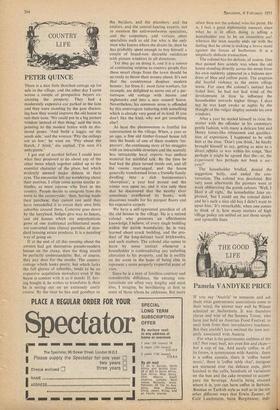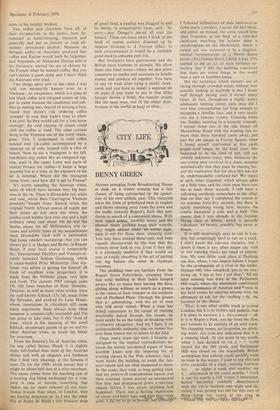THE GOOD LIFE Pamela VANDYKE PRICE
If you say 'Austria' to someone and ask them what gastronomic associations come to their mind, the answer may well be Wiener schnitzel or .Sachertorte. It was therefore clever and wise of the Sonesta Tower, who have just held an Austrian Food Festival, to omit both from their introductory luncheon. But they couldn't have omitted the item inst- antly associated with Austria.
For what is the gastronomic emblem of the vic? Not roast beef, not even fish and chips— but a cup of tea. And surely coffee, in all its forms, is synonymous with Austria: there is a coffee cantata, there is 'coffee house music', there is 'coffee table chat', intrigues are nurtured over the delicate cups, plots hatched in the cafés, hundreds of variations on the bun and the cake invented to accom- pany the beverage. Austria being situated where it is, you can have coffee in Serbian, Bosnian or Turkish style as well as in the ten other different ways that Erwin Zauner, of Café Landtmann, beim Burgtheater, indi- cates in his helpful booklet.
Tea, coffee and chocolate have all, at their introduction to the public, been de- nounced as habit-forming, immoral and generally bad just as fiercely as total ab- stainers denounced alcohol. Madame de Sevigne, addict of chocolate, predicted that coffee and Racine would both be forgotten, and Napoleon, so Alexandre Dumas tells in his dictionary, started the use of chicory by the French when he banned coffee. But you can't defeat a good drink and I don't think the Austrians ever tried.
Two things quite new to me—and, I was told, not necessarily known even to a Viennese: an einsplinner, which is a glass of hot black coffee and whipped cream on top, got its name because the coachmen and cab- bies at posting inns, fearful of missing a fare, found they daren't risk ordering coffee 'straight' in case they hadn't time to allow it to cool. So they would call for a 'one horse carriage', the cold topping of cream could chill the coffee at need. The other curious thing is the Viennese use of the word `maza- gran.' This, I understand, is cold coffee poured over ice-cubes, accompanied by a separate tot of rum, topped with a slice of lemon. Now to me a mazagran is the tall, handleless cup, rather like an elongated egg- cup, used in the tipper Loire and parts of central France for coffee—it keeps a large quantity hot at a time, as the exposure to the air is minimal. Where did the mazagran come from—and how did it get to France?
It's worth sampling the Austrian wines, some of which have become very big busi- ness in the UK. There is Hirondelle red. white and rose, which Bass Charrington Vintners promptly"' bought from Austria when the original North African source of supply put their prices up just once, too often; the jumbo-sized bottles (just over one and a half ordinary ones) cost about 14s 6d and the bottles about lOs 6d! Millionaires, city ty- coons and artistic types of my acquaintance slosh Hirondelle back with a persistence that keeps retailers reordering—but you can always get it at Hedges and Butler, in Regent Street, if your local source is temporarily dry. International Distillers and Vintners re- cently launched Schloss Grafenegg, which is estate-bottled Prinz Metternich (that dip- lomat was adroit at getting for himself all kinds of excellent wine properties); it is made from the Veltliner grape, very light and fresh. The current 1967 vintage costs 19s 10d from branches of Peter Dominic. Dominic, as well as many other outlets. have the well-known Schluck (15s 5d), made from the Sylvaner, and evolved by Lenz Moser, whose innovations in viticulture still cause many arguments; these always arise when someone is commercially successful and l'm not going to take sides, but if this 'drop of wine', which is the meaning of the word Schluck, encourages people to go on and try other Austrian wines, so much the better for everyone. •
From the Sonesta's list of Austrian wines, try one called Steiner Hund; it is slightly more full-bodied than most of the Austrian whites and with an elegance and freshness that I find very pleasing; at the Sonesta it costs 32s for the 1969, which means that it might be about'half that at a wine merchant. The name comes from the touching tale of a hunting dog being exchanged for a vine- yard in time of famine, something that makes me far more tolerant of our four- footed friends than when, in London. they are fouling doorsteps or, as I saw the other day in Justin de Blank's tiny treasure shOp of good food, a yapdog was dragged in and its owner, in unapologetic tones, said: `So sorry—dear Dougal's pee-ed all over the lettuce.' These are times when I think of the book of canine cookery dreamed up by Andrew 'Graham in A Foreign Affair; in such circumstances it would be a veritable good deed to consume porn frit.
But foreigners have gastronomy and the British have kindness to animals. We allow them into food stores—where we also allow customers to smoke and assistants to handle money and produce all together. You have to pay to wash after using a public cloak- room and you have to install a separate set of pipes if you want to put in that filthy foreign device, a bidet. No wonder people like me need wine, one of the oldest disin- fectants in the world, to keep us alive.



































 Previous page
Previous page